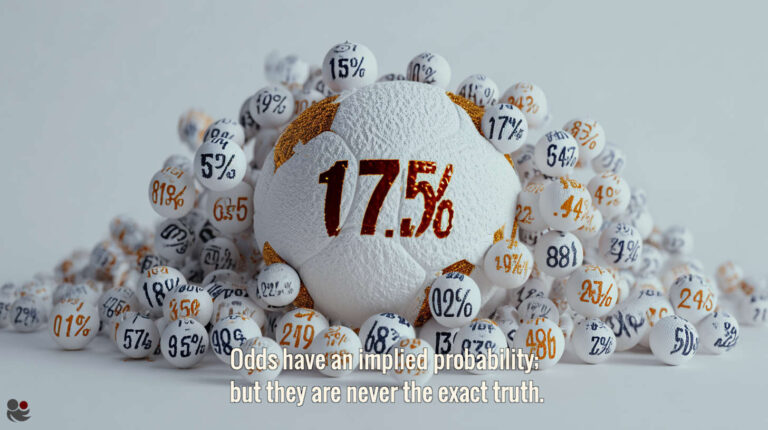
Everyone has a say on ‘form’ - but do you actually know what it means?
What exactly is understood by the term form when applied to teams in a football match?
The Illusion of Form – and What to Use Instead
The Value Calculator: A Case Study in Ignoring ‘Form’ (Mostly)
So the answer?
The reader will have to excuse our growing ignorance of the concept of form, but we dare to propose that the true meaning of the word is completely unclear – and misunderstood by many.
Soccerwidow has now been analysing and researching football and statistics for over 15 years and, in summary, the term form is both misleading and mysterious. Everyone talks about it, yet no one can quite put their finger on what it is.
This article therefore questions the concept of form, and we wish to encourage you to join the discussion in an effort to define and explain what is really meant by it.
FORM: The Favourite Word That No One Can Define ⤴️
The word form is tossed around by commentators, pundits, and punters as if it had a precise meaning. Yet when you look closely, its definition slips through your fingers.
Depending on who you ask, form can mean very different things:
-
A Harvard Sports Analysis blog once tried to formalise form.
‘Form‘ as a weighted sum of “points above expectation” (PAE) – the difference between actual and expected results (based on bookmakers’ odds) in recent matches, with greater weight given to more recent games.
That’s quantifiable – but pretty complex, and therefroe not widely used by casual punters.
(Source: Harvard Sports Analysis, 2015) -
Everyday usage:
If one speaks of ‘form‘, it usually refers to a team’s recent performance – typically over the last few games – and how well or poorly they’ve played, whether they are climbing up the league table or dropping down.
Applied to players, it means how closely they are performing relative to their perceived potential – for example, the goal machine who sometimes misses for weeks, but is said to be “in form” when scoring freely.
There is clearly no clear definition.
What none of the attempts to define ‘form‘ is taking into consideration is whether it was just a stroke of good or bad luck for the teams.
Or have you never had a few consecutive weeks (or even months) in your life when everything just went right – or wrong – for no obvious reason at all?
Going to the shop and just finding great bargains, speaking with the boss and getting an unexpected pay rise, meeting someone new and getting the feeling that you’ve known each other for eternity.
But how long will that lucky (or unlucky) strike last?
The Illusion of Form – and What to Use Instead ⤴️
So, is there a clear, universally accepted definition of form?
Not really. There’s overlap, yes, but no consensus. It’s more of a emotional shorthand than a technical one.
Everyone talks about form as if it were a solid, universal thing – but when you scrape away the surface, you find mush.
So what’s a punter supposed to do with that?
Voices from Soccerwidow’s Core Team
Forget ‘form‘. Treat it as a myth, or at best a mood word. If you rely on it, you’re feeding the bookmaker exactly what they price for – punter bias. The only sane move is to ignore ‘form‘ completely in your calculations and stick to hard data. If you want to win, stop paying for smoke.
Most punters won’t ditch it. Form is part of the fun: checking the tables, following streaks, believing in momentum. If you take betting as entertainment, there’s no harm in using form – it gives you a story to tell yourself. But don’t expect profits.
You can’t just ignore it, though. If a striker’s scoring every week, or a team looks like they’ve got their act together, you’d be daft not to notice. The trick is not to make it your only reason for betting. Use it alongside other stuff – odds, injuries, tactics. Think of form as a clue, not proof.
Form must be defined in terms of measurable deviation from expectation – like using PAE (points above expectation) or expected goals metrics. Without that, it’s a fog with no predictive value. Only when form is broken down into causality – tactical change, returning personnel, improved underlying metrics – does it become useful.
The rational approach is to reframe ‘form‘ as variance around expectation. When you see a streak, ask:
- Is this down to genuine structural change (tactics, line-ups, fitness)?
- Or is it simply a short-term fluctuation that will regress to the mean?
Unless you can link the ‘form‘ to an identifiable cause, assume it has little predictive value. The gambler’s task is to separate signal from noise.
It’s amazing how loudly people speak about ‘form’,
considering no one can actually explain it.
For me, form is just a narrative: something to keep fans engaged, something to argue about in the pub, to follow on the tables. All in all – just big business, built to entertain.
If you want a far grimmer example of how superficial indicators hide structural failures, see
Low‑Tier Match‑Fixing: The Shadow Wage System in Plain Sight.
The Value Calculator: A Case Study in Ignoring ‘Form’ (Mostly) ⤴️
One of Soccerwidow’s first products was the Value Calculator, and we used to receive regular enquiries asking whether we considered form in our match analyses and value bet recommendations.
At the time – in 2012 – we also published match reviews here on the website, as well as on the Betfair blogs in both, Germany and the UK.
Our approach to analysing matches and picking bets for the Value Calculator was as follows:
- Step 1: Historical results
We would take the historical results of the last 25 games of each team – that is, 25 home games if the team was playing at home, and away games if playing away – and combine these with the head-to-head results of both teams at that venue over at least the last 10 years, in order to compute initial odds.
- Step 2: Probability calculation
The probabilities of each betting option were then calculated – and form played no role at this stage.
- Step 3: Value bet selection
Once the probabilities of each event had been determined, we calculated what the corresponding odds should be, and compared them with the market odds. Only bets where the market odds and our own calculations diverged were selected.
- Step 4: Short-list
Usually, there were four or five potential ‘value’ bet candidates – but sometimes there were none (meaning that our odds calculations corresponded closely with the market), and only very rarely were there more than five.
- Step 5: Incorporating form
For making the final selections (the actual picks), incorporating an element of form became necessary.
We would look at the last six matches in more detail and consider against which teams those results were achieved – whether relatively weaker or stronger opponents.
We might also read a few current articles about the teams in general, such as injury news, suspensions, and so on, before finalising the short-list of bets that were deemed to hold value.
This approach seemed to work admirably, as the picks consistently returned a positive ROI – but whether our strategy considered form sufficiently remains an open question.
- Total Net Profit: 252.81 units
- Total Turnover (stakes risked): 2,166.77 units
- Average Yield: 11.67% (profit divided by turnover)
- Return on Investment (ROI) over the 7-month span: 505.63%, meaning the starting bank quintupled.
- Average Monthly ROI: 29.91%
So, while that monthly figure of nearly 30% is eye-catching, the overall yield across all bets is actually less than half that – just under 12% – reminding us once again that yield is not the metric to focus on.
So the answer? ⤴️
👉 Don’t trust form as a standalone input.
- If you’re betting for entertainment, use it as colour.
- If you’re betting seriously, only touch it when you can pin it to something causal (injury returns, tactical change, fixture strength).
Otherwise, you’re just buying into the same illusion as everyone else.
Feel free to share your view on what form means to you.
Thank you in advance for your valued opinions and contributions.








On previous standings crystal palace had a better form to Manchester united and it hit 4:0
For me form has a great influence on decisions on most bets
Hi Soccerwidow,
Here are the results of my pick selection.
FF = ‘form factor’. SP = ‘scoring potential’. * = actual bet.
MAN CITY (FF 9, SP 34.7) v Everton (FF 5, SP 4.9) – Man City win 3 – 1*
LIVERPOOL (FF 6, SP 3.9) v Crystal Palace (FF 0, SP -24.7) – Liverpool win 3 – 1*
Sunderland ( FF 0, SP -15.4) v MAN UTD (FF 3, SP 24.7) – Man Utd win 1 – 2*
West Brom (FF 3, SP 0) v ARSENAL (FF 9, SP 19.7) – draw 1 – 1
BIRMINGHAM (FF 7, SP 19.3) v Bolton (FF 2, SP -39.5) – Bolton win 1 – 2
BURNLEY (FF 11, SP 30.8) v Reading (FF 8, SP 9.9) – Burnley win 2 – 1*
Doncaster (FF 4, SP -7.7) v LEICESTER (FF 10, SP 9.9) – Doncaster win 1 – 0
QPR (FF 10, SP 19.3) v Barnsley (FF 5, SP -34.5) – QPR win 2 – 0*
WIGAN (FF 8, SP 11.6) v Blackburn (FF 5, SP -4.5) = Wigan win 2 – 1
Colchester (FF 5, SP 0) v WOLVES (FF 10, SP 19.7) – Wolves win 0 – 3*
Oldham (FF 4, SP 0) v LEYTON ORIENT (FF 12, SP 39.5) – draw 1 – 1*
SWINDON (FF 10, SP 27) v Tranmere (FF 3, SP -19.7) – Swindon win 1 – 0*
WIMBLEDON (FF 12, SP 11.6) v Northampton (FF 0, SP -34.5) – Northampton win 2 – 0
MANSFIELD (FF 8, SP 23.1) v Hartlepool (FF 3, SP -14.8) – Hartlepool win 1 – 4
Morecambe (FF 8, SP 11.6) v CHESTERFIELD (FF 10, SP 24.7) – Morecambe win 4 – 3
SCUNTHORPE (FF 8, SP 11.6) v Cheltenham (FF 3, SP -29.6) – Scunthorpe win 2 – 0
9 correct out of 16. I placed a £1.00 bet on a selection of 8 from this 16, and was let down by 1 team – Leyton Orient, which would have won me £40.00 if they had won.
No matter what system any one uses, no one could have foreseen or even have intuited some of these results, they came right out of leftfield, however, I haven’t checked the historical data for these matches over the last 5 seasons. Some of these results suggest that some teams were given injections of a super serum before leaving the dressing room in order to overcome poor form and absence of scoring ability. Very annoyed with Leyton Orient!
Just goes to show that ‘form’ can appear and disappear on the day. It’s a very volatile commodity, but the most accurate data element to go off when deciding whom to bet on.
Best wishes
Hi Soccerwidow,
Thought I’d take a shot at your question on ‘form’, what it is, and what data elements provide for its inclusion in accurate probability rankings?
Form is fundamental to the success or failure of the team. It signifies consistent strong or weak team performances. It’s not just indicated by the amount of games a team wins contiguously, but how they win the games, and by what score.
The only reliable data elements one can use to build a good and accurate probability rank are how many wins, draws, and losses a team makes, but also by the goals they score and concede.
Other factors do come into play such as venue, weather, injuries, but the effects of these will show up in the aforementioned data elements, and the fact is, these superfluous effects are not (or shouldn’t be) long lasting, certainly not through an entire season.
An earlier poster remarked (as I have in another post to you) that past season’s results do not affect the current season, as many variables change season to season; managers and players depart the team, new ones come in. The team may have won promotion or have suffered relegation, so past season’s performances are not good indicators of how well a team will do in the current season, only current results indicate current form.
Good luck!
I’m curious of the outcome and your learning process…
Hi Soccerwidow,
As an experiment to show the efficacy of the system I use for ‘win’, ‘draw’ and ‘loss’, here are my picks for this coming Saturday’s games. Let’s see (gulp) how it plays out?
Premier ‘win’ picks:
Man City
Liverpool
Man United
Arsenal
Championship ‘win’ picks:
Birmingham
Burnley
Leicester
QPR
Wigan
League One ‘win’ picks:
Wolves
Leyton Orient
Swindon
League Two ‘win’ picks:
Wimbledon
Mansfield
Chesterfield
Scunthorpe
Here I give 16 teams selected to win their match, all based on ‘current form’ and ‘scoring probabilities’. Out of this selection that my system gives, I would only bet on 8 matches on an accumulator.
My ‘hit’ rate has been 6 out of 8 consistently, and thus have never won an accumulator yet (lol). A team can overturn a poor run of form in one match, or a team experiencing a good run of form can equally dip in form in one match, both circumstances lead to losing the bet. Sods Law might deem me not getting one right!
You may not believe it, but I’m not a big gambler. I do the football and the Irish Lottery. I have never won on the football, but have won many times on the Irish Lottery, pick 3 from 45 (£576 each win).
I am currently unemployed due to redundancy last year, so have a lot of spare time on my hands, and thus I’m trying to keep both body and mind active while out of work. I am certainly not looking to supplement income through gambling, that I know would be silly. I don’t touch horse racing as the only thing I know about a horse is that one end talks and the other end provides copiously for gardens.
So, in my abundant spare time I am looking at games of betting and probabilities, which provides me with exercise on my Excel skills and formulae, whilst hopefully aiding me to a higher win probability whenever I can afford to make a bet, which hasn’t been for sometime now. The two games I focus on are football and the Irish Lottery.
With the Irish Lottery, I have uncovered the fact that ‘repetition’ is purposely built into the game, it is not truly random. I discovered this from a sampling of 20 months worth of lottery games, and saw that numbers reappeared the following game consistently. Not just one number (or the same number over and over), but quite often 2 and 3 numbers repeating the following game. The most I have seen is 3 numbers reappearing from the previous game. What are the odds for the following…
1 number to reappear in the next game?
2 numbers to reappear in the next game?
3 numbers to reappear in the next game?
4 numbers to reappear in the next game?
…out of a sampling of the last 191 contiguous games numbers repeated as follows…
1 number repeated 70 times
2 numbers repeated 40 times
3 numbers repeated 9 times
4 numbers repeated 1 time.
…if we dismiss the X4 repetition as a statistical quirk, the amount of the other repetitions have to be circumspect in a truly random game? If we can find the odds for 2 numbers reappearing the next game, and then multiply that by 40, I should think the likelihood that the lottery game is truly random can be discounted? I believe the reason why repetition is purposely built into the game is to ensure that players cannot dismiss using the previous drawn numbers, as this would mean they would be picking from 39 numbers instead of 45, which would be viewed as an unfair advantage. Inbuilt repetition ensures picking from 1 to 45 numbers. The conclusion is then that lottery games are not truly random? However, knowing this can be used to advantage, because it infers a deterministic pattern (yet to be discovered) appearing over a large enough sampling.
Best wishes
Hi Soccerwidow,
Back again to clarify some points I make in my post (Football Betting Odds Calculation Course – How to Calculate Odds – Over / Under ‘X’ Goals).
In the second paragraph where I state…”…and using only historical result data…”, should read “…and using only recent results data…”.
Man City’s score probability is not 50.8%, but 34.7%. I mistakenly used a variable element from a different competition, and have adjusted the probability. Form factor remains the same, and thus Man City should still win, if both teams play to form.
I only use recent results data in my own spreadsheet, and quickly realised that it is very important to use the right data elements in order to achieve good probability figures that can guide one’s betting. The older the season becomes, and thus, the more matches played, the data elements entered onto the spreadsheet will mature and provide more accurate probability figures than at the start or earlier part of the season.
I watched one of your videos on YouTube, and saw just how comprehensive your spreadsheet is. My own spreadsheet is nowhere near as comprehensive and involving, in fact, the amount of data elements I use is only 10, but I know they provide me with an accurate real world probability figure I can use to draw out the matches on which to bet – between 6 and 8 matches only each week.
Of course, there are pros and cons to all systems, and mine is no exception. The fact that my system, my spreadsheet, and the data I use, is only meant to draw out form strength and weakness of each team, and these two variables will indeed, constantly vary throughout the season, the variability of the ‘unknown influence’ to interject in real time upon the probability figure, remains a constant threat even while the game is being played, and after the bet has been made. No amount of data can include the ‘unknown influence’…and that’s the con to my system, and the reason why I haven’t won an accumulator bet.
I am currently achieving 80% accuracy with my predictions, which is why I am now looking at combination bets. These bets allow for one or two of ones predictions to be wrong or fail to materialise, but will still pay out on the predictions that do materialise. However, the cost of the bet for combinations is a lot higher than accumulator bets.
Best wishes